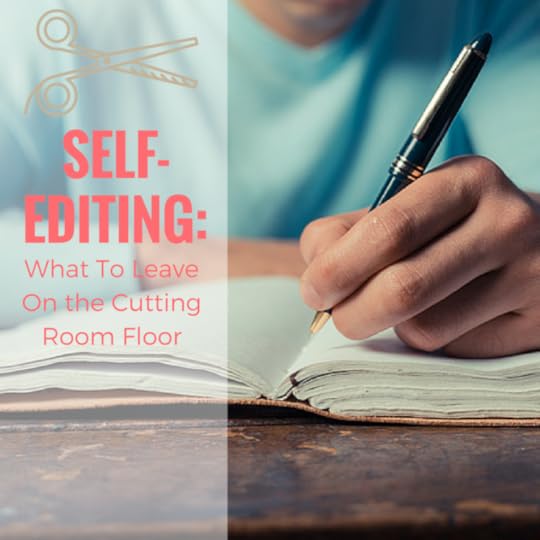Peter Lopez Jr.'s Blog: Xulon Press Blog , page 39
February 5, 2016
8 Famous Writers Spill Their Secret Writing Routines

I’ve spent a lot of time pouring over the daily routines of notable writers and learning what inspired their creative energy to pour out onto paper in the form of writing. Much like a baseball player won’t wash his lucky socks during a long stretch of wins in fear of breaking the streak—writers develop their routines and don’t dare deviate, for the fear of showing up to type with no words bouncing around in their heads is terrifying!
We’re all busy: family, jobs, a social calendar, favorite television shows. We use these things to make excuses to avoid the keyboard, but the notable writers below wrote long-hand with pencil and paper, on manual typewriters, when they didn’t feel like it, when they didn’t make a dime, when they felt like giving up, when everyone was telling them they couldn’t do it. They kept writing. So, let this post serve as your last excuse to avoid your keyboard, find some motivation below, and beat the cursor! (Remember, it could be worse—John Steinbeck wrote his books in pencil.)
Ernest Hemingway
Quote: “My aim is to put down on paper what I see and what I feel in the best and simplest way.”
Writing Routine: When I am working on a book or a story I write every morning as soon after first light as possible. There is no one to disturb you and it is cool or cold and you come to your work and warm as you write. You read what you have written and, as you always stop when you know what is going to happen next, you go on from there. You write until you come to a place where you still have your juice and know what will happen next and you stop and try to live through until the next day when you hit it again. You have started at six in the morning, say, and may go on until noon or be through before that.
Henry Miller
Quote: “Writing, like life itself, is a voyage of discovery.”
Writing Routine:
Work on one thing at a time until finished.
Start no more new books, add no more new material to “Black Spring.”
Don’t be nervous. Work calmly, joyously, recklessly on whatever is in hand.
Work according to Program and not according to mood. Stop at the appointed time!
When you can’t create you can work.
Cement a little every day, rather than add new fertilizers.
Keep human! See people, go places […]
Don’t be a draught-horse! Work with pleasure only.
Discard the Program when you feel like it—but go back to it next day. Concentrate. Narrow down. Exclude.
Forget the books you want to write. Think only of the book you are writing.
Write first and always. Painting, music, friends, cinema, all these come afterwards.
John Steinbeck
Quote: “Abandon the idea that you are ever going to finish. Lose track of the 400 pages and write just one page for each day; it helps. Then when it gets finished, you are always surprised.”
Writing Routine:
My choice of pencils lies between the black Calculator stolen from Fox Films and this Mongol 2 3/8 F which is quite black and holds its point well—much better in fact than the Fox pencils. I will get six more or maybe four more dozen of them for my pencil tray.
I have found a new kind of pencil—the best I have ever had. Of course it costs three times as much too but it is black and soft but doesn’t break off. I think I will always use these. They are called Blackwings and they really glide over the paper.
In the very early dawn, I felt a fiendish desire to take my electric pencil sharpener apart. It has not been working very well and besides I have always wanted to look at the inside of it. So I did and found that certain misadjustments had been made at the factory. I corrected them, cleaned the machine, oiled it and now it works perfectly for the first time since I have it. There is one reward for not sleeping.
Haruki Murakami
Quote: “I have to write things down to feel I fully comprehend them.”
Writing Routine:
When I’m in writing mode for a novel, I get up at four a.m. and work for five to six hours. In the afternoon, I run for ten kilometers or swim for fifteen hundred meters (or do both), then I read a bit and listen to some music. I go to bed at nine p.m. I keep to this routine every day without variation. The repetition itself becomes the important thing; it’s a form of mesmerism. I mesmerize myself to reach a deeper state of mind. But to hold to such repetition for so long—six months to a year—requires a good amount of mental and physical strength. In that sense, writing a long novel is like survival training. Physical strength is as necessary as artistic sensitivity.
Jodi Picoult
Quote: “You can’t edit a blank page.”
Writing Routine:
I get up at 5 a.m. and walk for three miles with a friend (I do it for the gossip). I come home, shower, get my daughter off to school, make coffee and a bowl of yogurt with banana, and head up to my office.
On a shelf above my computer are five letters that spell out W-R-I-T-E. Just in case I forget why I’m there. I also have Wonder Woman paraphernalia from when I wrote five issues of the comic, and pictures of my husband and kids.
E.B. White
Quote: “Writing is an act of faith, not a trick of grammar.”
Writing Routine: Except for certain routine chores, I never knew in the morning how the day was going to develop. I was like a hunter, hoping to catch sight of a rabbit. There are two faces to discipline. If a man (who writes) feels like going to a zoo, he should by all means go to a zoo. He might even be lucky, as I once was when I paid a call at the Bronx Zoo and found myself attending the birth of twin fawns. It was a fine sight, and I lost no time writing a piece about it. The other face of discipline is that, zoo or no zoo, diversion or no diversion, in the end a man must sit down and get the words on paper, and against great odds. This takes stamina and resolution. Having got them on paper, he must still have the discipline to discard them if they fail to measure up; he must view them with a jaundiced eye and do the whole thing over as many times as is necessary to achieve excellence, or as close to excellence as he can get. This varies from one time to maybe twenty.
Maya Angelou
Quote: “There is no greater agony than bearing an untold story inside you.”
Writing Routine:
I write in the morning and then go home about midday and take a shower, because writing, as you know, is very hard work, so you have to do a double ablution. Then I go out and shop — I’m a serious cook — and pretend to be normal. I play sane — Good morning! Fine, thank you. And you? And I go home. I prepare dinner for myself and if I have houseguests, I do the candles and the pretty music and all that. Then after all the dishes are moved away I read what I wrote that morning. And more often than not if I’ve done nine pages I may be able to save two and a half or three. That’s the cruelest time you know, to really admit that it doesn’t work. And to blue pencil it. When I finish maybe fifty pages and read them — fifty acceptable pages — it’s not too bad. I’ve had the same editor since 1967. Many times he has said to me over the years or asked me, Why would you use a semicolon instead of a colon? And many times over the years I have said to him things like: I will never speak to you again. Forever. Goodbye. That is it. Thank you very much. And I leave. Then I read the piece and I think of his suggestions. I send him a telegram that says, OK, so you’re right. So what? Don’t ever mention this to me again. If you do, I will never speak to you again. About two years ago I was visiting him and his wife in the Hamptons. I was at the end of a dining room table with a sit-down dinner of about fourteen people. Way at the end I said to someone, I sent him telegrams over the years. From the other end of the table he said, And I’ve kept every one! Brute! But the editing, one’s own editing, before the editor sees it, is the most important.
Shauna Niequist
Quote: “I write when it’s writing time, and generally that’s it. I try to take good notes the rest of the time, so that I can avoid the dreaded page/blinking cursor.”
Writing Routine:
I know there are lots of writers who try to beat the day, to shut out the world for a while, then rejoin it after the writing’s done. For me it works best to do the opposite: I like to clear away the business of the day, and then circle down to a deeper writing place. I get up with Henry. We have breakfast together and watch the Backyardigans. After he and Aaron leave for school and work, I run through emails, check Facebook and Twitter, read my favorite blogs. I make or adjust my to-do list, deal with anything that needs to be dealt with–upcoming events or deadlines.
And then I’m ready to dive into writing time. Again, I know this is opposite from what a lot of people tell you, but it’s what works for me. It wouldn’t work for me to cocoon away first thing in the morning, and deal with all the details of life when the writing’s done–I’d worry the whole time: “How’s Henry this morning? Did I forget something for school? Is Brannon or my editor waiting on me for anything?” For me, it’s better to know that the details are taken care of–that lets me disconnect for a little while without worrying.
Mostly, I write at home. I have a desk in our guest room, but I mostly sit in a huge old chair-and-a-half in our living room. I love all the windows, especially all this time of year, all the green. If I’m feeling antsy, there are a few coffee shops I like, and if I’m feeling desperate, there’s a little office at church that I can hideout in–my way of telling myself I really mean business.
Sources:
http://www.theparisreview.org/interviews/4825/the-art-of-fiction-no-21-ernest-hemingway
http://www.theparisreview.org/interviews/4156/the-art-of-fiction-no-45-continued-john-steinbeck
Henry Miller on Writing
http://www.theparisreview.org/interviews/2/the-art-of-fiction-no-182-haruki-murakami
http://www.theparisreview.org/interviews/4155/the-art-of-the-essay-no-1-e-b-white
http://www.theparisreview.org/interviews/2279/the-art-of-fiction-no-119-maya-angelou
The post 8 Famous Writers Spill Their Secret Writing Routines appeared first on Xulon Press, Christian Self Publishing.
February 3, 2016
February Things: Black History Month, How to Write a Devotional, and Why We “Heart” Xulon Press.

And just like that, the first month of 2016 is already gone. But here on the Xulon Press blog, we’re launching headfirst into all things February.
We’re inviting authors to share what they love about Xulon Press on social media using the hashtag #IHeartXP. What made you choose Xulon Press? Our award-winning designers? Perhaps you appreciate our steadfast commitment to keeping messages of hope on the shelves of bookstores around the world? Share it with us now on Facebook, Twitter and Instagram by tagging @XulonPress and using the hashtag #IHeartXP.
February is also Black History Month, which we’ll be celebrating with a couple of dedicated posts on the blog. This country would not be the same without the brave prayers of so many of its African-American citizens; just as American literature would not be the same without the contributions of so many fantastic African-American authors. We’ll be putting out a list of our top books to read during Black History Month, and I strongly encourage you to pick one—at least one—book by one of these very talented writers to read over the next few weeks. The landscape of literature has been richly improved by their contributions.
We’ll also be providing a steady flow of the educational content you’ve come to know and expect from Xulon Press: writing tips and tricks, and a special piece dedicated exclusively to best practices for writing devotionals and Bible studies. If you’re in the middle of writing a devotional, you’ll want to keep your eyes peeled for expert advice from our staff editors.
(#IHeartXP too),
Brittnee Newman
The post February Things: Black History Month, How to Write a Devotional, and Why We “Heart” Xulon Press. appeared first on Xulon Press, Christian Self Publishing.
January 26, 2016
The 5 Most Common Answers to Prayer

In my time at Xulon Press, I’ve had the opportunity to see God’s continual influence on our authors and the books they publish. One of the most powerful things I’ve seen is how prayer is connected to publishing. Here at Xulon Press, here are the 5 most common answers to prayer that we’ve heard from our authors—and a few specific testimonies on how they’ve been answered!
Prayers for Direction. We had an author who wanted to write a book, but didn’t know where to begin. They were almost paralyzed until God opened their eyes to the beginning while they were sleeping. They credit prayer for the direction they received.
Prayers for Inspiration. We heard from an author who’d been totally stuck for months with writer’s block, but finally found fresh inspiration after a dedicated time of prayer. They said all the effort in the world couldn’t help them—until they stopped and prayed.
Prayers for Support. There was a brand-new author who simply felt alone, without support in the writing process. They found that support through prayer as God came alongside them, and also brought others to help and encourage them.
Prayers for Finances. We spoke with an aspiring author who had the message for a great book, but lacked the finances to begin. They prayed and prayed, and miraculously the money was provided without even asking anyone for help. Time and time again, I’ve heard answered prayers about finances for our authors.
Prayers for Influence. We worked with an author who really wanted his book to have an impact. After praying for God to use it to touch lives, they heard from someone who thanked them for writing the book—it saved their marriage. This author credits it to answered prayer.
While ink, paper, editing and marketing are so important to publishing a Christian book, there is no replacement for prayer—and I’ve seen how prayer and publishing are divinely connected. An author’s book is never complete without prayer. No matter where you are at in the publishing process, we are praying for you.
The post The 5 Most Common Answers to Prayer appeared first on Xulon Press, Christian Self Publishing.
January 18, 2016
Xulon Press Proudly Announces Winners of January 2016 Christian Writers Awards Writing Contest
Xulon Press was thrilled once again to extend an opportunity to Christian writers to have their work recognized and be rewarded. Besides the esteemed honor of being named January 2016 Christian Writers Awards Writing Contest winner, the Grand Prize Winner will receive a Xulon Press Elite Publishing Package (valued at $8,780) and a professionally-crafted press release to announce their win to the media, to bookstores, and on Xulon Press’ website. Of all the outstanding entries received from around the world, three winners were chosen after careful deliberation.
 The January 2016 Christian Writers Awards Writing Contest winners are:
The January 2016 Christian Writers Awards Writing Contest winners are:
Grand Prize Winner
That Other Woman by Sally Moore
2nd Place
Somerset by Casey Hutcheson
3rd Place
The Mustard Seed by Anne Amaro
Congratulations to all of the winners! Xulon Press would like to extend a big thank you and congratulations to every talented author that participated in the January 2016 Christian Writers Awards Writing Contest. It was really hard to choose winners from such a talented group of authors. Continue writing and perhaps you could be a winning author in the next exclusive Christian Writers Award – just like the names above!
Xulon Press, a division of Salem Media Group, is the world’s largest Christian self-publisher, with more than 15,000 titles published to date.
Media Contact: Xulon Press
Email: contest@xulonpress.com
The post Xulon Press Proudly Announces Winners of January 2016 Christian Writers Awards Writing Contest appeared first on Xulon Press, Christian Self Publishing.
January 12, 2016
From the Desk of the Editor: How To Build Creative Confidence In Your Writing
 I’ll let you in on a secret: writing is less about professional training, and more about creative confidence. Anyone can string together a few decent sentences. The difference is that those with creative confidence will share their decent sentences with anyone and everyone, while other writers hide their work away from the world—proclaiming it isn’t good enough for public consumption.
I’ll let you in on a secret: writing is less about professional training, and more about creative confidence. Anyone can string together a few decent sentences. The difference is that those with creative confidence will share their decent sentences with anyone and everyone, while other writers hide their work away from the world—proclaiming it isn’t good enough for public consumption.
Don’t get me wrong, there is a difference between putting work out that hasn’t been revised, edited and proofread, and putting out work that you deem lesser than someone else’s work.
Each time you negatively compare your work to another, devalueing your skill set, your talent, or your entire creative existence, you are desecrating your creative confidence. If you do that one too many times, you could convince yourself of altogether abandoning the gift of storytelling that God placed in you.
The good thing is, you can never get too far down that road of negativity. It does take work, however, to get yourself back on a confidence-building path. That work lies solely within you—no one else can give you confidence, especially confidence in your own writing. You have to cultivate it deep within your soul. How do you build creative confidence? First, we have to look at the three most common forms of confidence-bashing we subject ourselves to.
3 Ways to Kill Creative Confidence
1. Don ’t share your work with anyone—ever.
Have you ever played one of those team-building games where you write down one thing no one would know about you, and the team has to guess who wrote it? Well, you don’t want to be the person that puts, “I like to write,” on a piece of paper and no one can guess it’d be you. God gives us talents and gifts that we are to share within our communities. If no one knows you write because you’ve never told them or shared something you’ve written with them, are you sharing your gift? I’m not saying you need to run up the closest mountaintop and scream, “I’m a writer!” for all to hear. Instead, find little ways to share your writing: join a local writing group, offer your services to the church newsletter or local newspaper, share short stories in Facebook posts. The more you share, the more creative confidence you build each time.
2. Spend more time comparing your work to other people instead of honing your own craft.
We live in a world where anyone can shame us for something we said, did, or didn’t do. Trends like fat-shaming and mom-shaming are negative social behaviors that fuel the bullying society we live in. Don’t let negativity from outside sources—or yourself—infiltrate your creative space. Stop comparing your work to something you’ve read, stop devaluing your own work, and stop telling others your work is awful. The more you hear negativity or speak negativity into existence, the more damage you do to your creative confidence. Words are powerful; you must be careful how you use them.
3. Take all criticism as negative criticism instead of looking at it as a learning experience.
Maybe you’re not type one or two above; you’ve shared your work with others and you don’t speak about your own work negatively, which is great. However, as soon as you receive criticism that doesn’t fall in line with what you want to hear, you shut down.
First off, criticism is part of the creative process, but how you respond to it and what you do with the information is 100% up to you. Instead of taking the criticism too personally, remove yourself and your emotions from the equation. Then, examine the facts provided in the feedback and use it as a way to improve your craft even more.
Everyone, from Shakespeare to Hemingway to Thoreau, were told they didn’t have what it took to craft a well-written story at some point in their writing careers. All three writers’ works now serve as teaching elements in English classrooms across the country—and the world. If these literary greats had taken negative criticism to heart, I wouldn’t be able to quote lines from Shakespeare’s plays, I wouldn’t have fallen in love with The Sun Also Rises in my American Literature class, and I wouldn’t know that I could appreciate Thoreau’s descriptions of nature.
Now: how do you flip the script, find your creative confidence, and keep it?
Most importantly, hold this truth close to your heart: if God has placed a calling on your heart to write, you must obey and write.
Second, if you feel unsure about your writing skills from an educational standpoint, pick up a copy of The Elements of Style and get those nitty-gritty English rules in your writer’s toolbox. A builder can’t build a house without tools, and a you can’t write a book without your writing toolbox.
Third, you have to write—a lot. Not everything you write will be shareable with the public, but that’s not the point. Share the work you’ve poured your heart and soul into, the work you’ve revised, rewritten and edited to perfection. Then, ask people what they honestly think about it. Stow every compliment, every “I loved it” in the back of your head. When you’re having a particularly rough day (and they will come), roll back over those compliments, and believe them!
Once you start filling your creative energy with positive reinforcement, you’ll grow your creative confidence. And trust me—confidence is like gold in the creative world.
The post From the Desk of the Editor: How To Build Creative Confidence In Your Writing appeared first on Xulon Press, Christian Self Publishing.
December 28, 2015
Self-Editing: What To Leave On the Cutting Room Floor

Often when I am thumbing through submissions at Xulon, reading a manuscript for our critique service, or simply editing a whole manuscript, I quickly pick up on a lot of material that is—in a word—unnecessary. If you’ve ever gotten our Editorial Critique, Manuscript Review, or had your book edited by me, you’ve more than likely received a comment or two instructing you what to leave on the “cutting room floor.”
Think of your book as a movie on a reel. From the title page to the index, from the climax to the back cover, each part of your book is in a filmstrip. When attached together, it creates the whole book.
A movie is edited before the final product is released into theaters. There are parts cut out, whether it’s a deleted scene, a “blooper”, or a scene an editor deems unfit for the final product. In the end, after editing, there are filmstrips left on the cutting room floor—and the final product is clean and concise. Make sense?
When self-editing, imagine your book is on a film reel and that you need to chop a few strips from the reel. What do you cut out? What is considered “unnecessary?” What doesn’t contribute to the overall value and point of your story? (This applies to fiction and nonfiction alike.)
In my cutting room, personally, there are three things I find myself chopping from nearly every manuscript:
Unnecessary words. The most superfluous and often-used words are: really, very, just, and seem. These words add no additional meaning or emphasis to your overall sentence, and therefore can be removed. Readers will still get what you’re trying to say. Example: “I just really love chocolate” can easily say, “I love chocolate.” The words “just” and “really” add nothing pertinent to the overall message, contribute to a high word count and disturb the flow of reading.
Defining words readers already know. This has become a trend in many nonfiction books lately. I recently edited a book where the author included the Webster dictionary definition to the words: “prayer”, “nothing”, and “private.” If someone is reading your book, they’re literate. Defining words that they already know the definition to is not only unnecessary, but also may frustrate the reader and make them feel belittled.
Scenes that don’t add to the overall story. When thinking of your book as the movie reel, remember that not everything will contribute to the overall message of your story. Each scene and each detail you show should be relevant to the story and should contribute something to your message.
During our author coaching sessions, I always tell authors that “less is more” when it comes to a book’s overall word count. Just because a book has a high word count doesn’t mean it’s good; it may mean there’s a lot of unnecessary words, and that some self-editing is in order.
Leave those words, definitions, and scenes on the cutting room floor and your book will be more clear, concise, and to the point!
The post Self-Editing: What To Leave On the Cutting Room Floor appeared first on Xulon Press, Christian Self Publishing.
December 21, 2015
Compassion in Action: Interview with Xulon Author Jacki Dirksmeyer

Editor Krystina Murray interviews Xulon author Jacki Dirksmeyer on her faith and the practice of “breaking bread” are impacting her local community.
Feed My Peeps is an organization in St. Louis, Missouri geared toward delivering food from local restaurants, caterers, farmer’s markets, and schools. Founded by Jacki Dirksmeyer in 2012, Feed My Peeps keeps many homeless families and those with limited resources nourished with love and good food. It all started with Dirksmeyer’s trip to Kenya and meeting a cancer-stricken young man, after which she became part of the mission team “Get the Word Out”, where she began feeding people from his village. Now, with Jacki’s thirty years of culinary and hospitality experience, members of the St. Louis community are well fed—both physically and spiritually.
Krystina Murray: Hi Jacki! It’s a pleasure to interact with you. Firstly, I find what you’re doing to be a great example of compassion. Have you always enjoyed volunteering and assisting others in need?
Jacki Dirksmeyer: I have a big heart. Serving is in my core. I used to think I had to rescue everyone. God showed me to open my arms and just be the vessel. God allows me to connect His dots to serve those in need. He’s just that cool.
KM: You have an impressive culinary background. You’ve worked at the Ritz-Carlton, the Holiday Inn and the Marriott. You and have been awarded the Local Food Hero Award at St. Louis University. How old were you when you started cooking? And when did you realize your calling involved the culinary arts?
JD: I started over thirty years ago in the hospitality industry. I believe everyone deserves to be treated special and recognized (I learned this from my years in catering at The Ritz-Carlton). I started serving our homeless friends in a small church basement on china and linen. I asked my chef friends to come and cook nutritional meals so the homeless would feel special. I’m an okay cook, but a better caterer. You have to measure and follow recipes to cook, which I don’t do. I simply add a dash of love with a pinch of kindness. I would sit on the stool next to my granny as a child and watch as she magically made handmade dumplings. She never measured either! Lots of love added.
KM: That’s very heartwarming. What are some of the challenges (both motivating and daunting) you experience or have experienced in maintaining a non-profit company?
JD: Feed My Peeps is a grassroots charity. We do NOT have a paid staff. We DO have a dedicated team of wonderful volunteers that make up the method to our madness. I used to worry that every volunteer should have a warm and fuzzy experience when serving with us. Well, that was exhausting on my part. I quickly learned God holds our little charity in the palm of His hand and will give out all the warmth. Silly me!
KM: Tells us about a time you felt like giving up, or struggled with doubt. How did you realize God’s presence in your life in this time?
JD: I told God that I was really exhausted a year ago in December. I told him that I was going to get a real J-O-B that paid. God let me throw my pity party, and then He showed up big time. We had a fundraiser concert at our home for Christmas. Our family and friends made a large monetary donation to the ministry. I learned to get “me” out of the way. I thought I had to hold a baby called “Feed My Peeps” tightly. I was blocking the blessings. Everyone could walk Feed My Peeps around the block. I got the God memo!
KM: What are valuable words of wisdom you’ve learned from those you serve?
JD: It takes a village to serve those in need. We share with like-minded folks who have the same serving hearts. My job is not to judge my neighbor who lives on the street. My job is to show the love of Christ with compassion, simply “one peep at a time.”
KM: Jacki, thank you for taking time to share your story. Anything you want to leave our audience with today?
JD: I never in a million years would think that I could walk away from a culinary career and make a difference. I was obedient to God’s call. He has allowed me to be the vessel creating a ripple effect to building better communities. I cried and complained, but being obedient when God calls is the lesson. Celebrate during the storm.

You can find out more about Feed My Peeps at the web site www.feedmypeeps.org and access Dirksmeyer’s book, One Peep at A Time, through Xulon Press, Amazon and Barnes and Noble, highlighting her journey of servitude and compassion of her community. She is also the recipient of the Clay Cooley Toyota Dealership St. Louis Favorite Charity Award, the and the 2015 St. Louis Rams Community Quarterback Award. If you’d like to help volunteer or donate, log on to the site above to connect to a greater cause.
The post Compassion in Action: Interview with Xulon Author Jacki Dirksmeyer appeared first on Xulon Press, Christian Self Publishing.
December 16, 2015
Say “Merry Christmas” with Shareable Social Media Images from Xulon Press!
Christmas is a time for sharing, so here’s a little something we’d like to share with you…
Festoon your social media pages with good cheer and BOOKS!
We’ve created some original holiday images for you to use. Visit our own Facebook and Twitter pages to see these graphics in action.
Merry Christmas,
The Xulon Press Family
Christmas Facebook Cover

To download, simply right-click on the image and select “save image as…”
Christmas Twitter Header

To download, simply right-click on the image and select “save image as…”
The post Say “Merry Christmas” with Shareable Social Media Images from Xulon Press! appeared first on Xulon Press, Christian Self Publishing.
December 1, 2015
Why Do Authors Pay Per Word For Editing?
 Many authors often ask us, “Why do editors charge per word for their services?” This is a valid question with an answer that may come as a surprise, or perhaps be an “Aha” moment for some, once explained in detail.
Many authors often ask us, “Why do editors charge per word for their services?” This is a valid question with an answer that may come as a surprise, or perhaps be an “Aha” moment for some, once explained in detail.
To explain in layman’s terms, without getting too complicated: editors charge per word because any time an editor edits a manuscript they read every word—whether they end up making a correction to it or not.
Not only does the editor read every word, but also every word is interpreted and dissected within the sentence to analyze what the author is trying to communicate, and if each word is the right word for what the editor interprets as the author’s intention for the book.
Authors may often think paying per word is too much, but each and every word in your manuscript (including all of the small “a’s”, “of’s”, and “I’s”) has three purposes behind it:
Syntax Purpose: the arrangement of words and phrases to create well-formed sentences.
Mechanical Purpose: the correct spelling and grammatical use of the word.
Placement Purpose: focuses on the overall flow of the manuscript; does it fit well with the tone? Does it communicate the theme correctly and consistently?
Furthermore, editors sometimes, in higher levels of editing (such as with Xulon’s Developmental Edit) will have better ways to say things than what the author has already written. So, by paying per word, you’re paying for the editor to make that judgment call on what is the best way to say and communicate your intention to best suit the reader.
Remember: an editor oftentimes reads your book not only as an editor, thus looking for the things mentioned above, but they read your book as a reader. So if they’re fixing something, or perhaps asking you to fix something and further elaborate, it’s for the purpose of your readers.
The post Why Do Authors Pay Per Word For Editing? appeared first on Xulon Press, Christian Self Publishing.
November 16, 2015
True Life: Finding Creative Purpose from Life’s Struggles
Xulon Press employee Elizabeth Marrero talks about how God used her biggest struggle to give birth to her creative purpose—and the book she’s publishing because of it.

Elizabeth Marrero
Xulon Press Author Services
When we moved back to the United States from Puerto Rico, I struggled with English. It was all Chinese to me (though it was English… ::kick drum, snare, high hat::).
My 1st grade teacher sent a letter home one day with me – that I couldn’t read – and that night, my mom and brother sat down with me and a book. My brother pointed at one word. “Esto dice Marty.” He pointed at another. “Esto dice Pepe.” My mind was blown. It all clicked together and I read an entire textbook to the teacher assistant the next day.
A year later, the school initiated me to the Young Author’s Club when I wrote The Day Santa Clause Lost His Button. I remember when I first showed the story to my 2nd grade teacher. She loved it so much, she read it out loud to the entire class. They loved it as well and laughed uncontrollably. Seems I had misspelled button and it was now The Day Santa Clause Lost His Bottom. Oops. (At least they were laughing!)
After that, I never thought much about writing a book. But in cleaning out some old papers, I found some life goals I had written, possibly during high school. And there it was: write a book.
Fast forward to about 5 years ago when I felt God wanted me to combine my love and knowledge of fashion with His Word. I started seeing fashion terms everywhere in Scripture. I began to research through the Bible entirely, marking all the verses I saw that used a fashion term or concept. I didn’t think I would find much but I quickly found too many to know what to do with. And there was birthed the idea of writing a book.
I researched where to publish. I wasn’t working here at the time, but I remember Xulon Press being one of the companies I researched. Then publishers started calling me. Woah, hold up. I haven’t even started writing! But the questions that were asked by the consultant got me headed in the right direction and I still ask myself the same ones today to make sure I’m hitting the mark in my writing.
Working at Xulon Press is definitely a “God thing.” He meant for me to write a book to reach people in a creative way. He led me here when I was in need of provision, not knowing that He was also providing to have this book published.
And now, I’m also known as Project I.D. #59429: the book FASHION: Holy. Sacred. Pure., which will be available for Christmas. I am so excited and so grateful to God and to everyone at Xulon who has been so encouraging in this journey.
The post True Life: Finding Creative Purpose from Life’s Struggles appeared first on Xulon Press, Christian Self Publishing.
Xulon Press Blog
- Peter Lopez Jr.'s profile
- 8 followers



